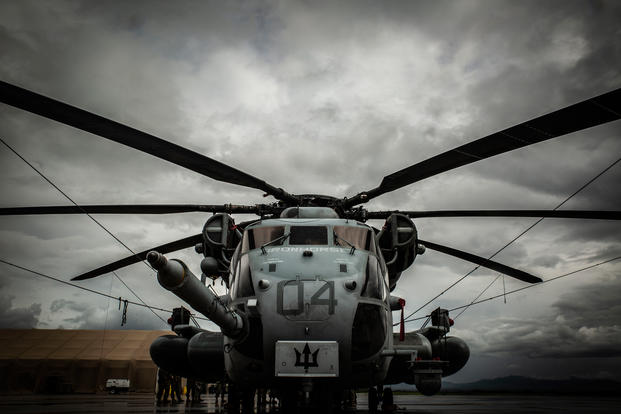The leadership of U.S. Marine Corps Forces, South, got a major upgrade Friday as a three-star general assumed command.
In an interview Thursday with Military.com, Adm. Craig Faller, head of U.S. Southern Command, said that MARFORSOUTH's increased stature and more senior commander will help the U.S. strengthen relationships with its 31 partner nations in the Western Hemisphere, including South America, Central America and the Caribbean.
Marine Lt. Gen. David Bellon assumed command of MARFORSOUTH, which has typically been commanded by a one-star general, in a ceremony Friday.
Read Next: These Are the First Military Bases Whose Confederate Names Could Be Changed
Bellon will be dual-hatted while commanding MARFORSOUTH and continue his current command of U.S. Marine Corps Forces Reserve. MARFORSOUTH is the Marines' component command for SOUTHCOM, and Bellon will command all Marine forces assigned there.
And, Faller said, the elevation of MARFORSOUTH's stature demonstrates not just the commitment of the U.S. to the region, but its recognition that global competition against major adversaries also takes place there.
"They look to the United States Marine Corps [as] the gold standard," he added.
Elevating the rank of MARFORSOUTH's leadership also brings additional personnel and capacity, with more skill sets, to the headquarters, Faller said.
For years, Faller and other SOUTHCOM leaders have raised concerns -- particularly to Congress -- about the command being under-resourced compared to other combatant commands.
This year, for example, SOUTHCOM took a "significant cut" to its intelligence funding and is now underinvested there, Faller said.
But upgrading the stature of MARFORSOUTH's leadership "will add additional emphasis there, additional capabilities, additional planning, bandwidth, thought, intel, across all the things that matter," he explained.
Faller said that SOUTHCOM is constantly examining the threats facing the Western hemisphere, and what the people, platforms and other resources at its disposal allow the command to do to counter those threats.
"In this hemisphere, in our neighborhood, a little goes a long way," he said. "This leverage [of upgrading the leadership and visibility of MARFORSOUTH in the region] can make a huge, disproportionate benefit."
Bellon succeeds Col. Michael McWilliams as MARFORSOUTH commander. McWilliams, who has been selected to receive his first star, will now serve as deputy commander for MARFORSOUTH and for MARFORRES.
Faller said that he's not concerned that being dual-hatted will stretch Bellon too thin, because he will have McWilliams -- and the staffs of both MARFORSOUTH and MARFORRES -- supporting him.
SOUTHCOM last March announced plans to send more assets to the region to fight high-seas drug trafficking; Faller said that effort has been successful.
In testimony before the House Appropriations Committee last month, Faller told lawmakers that, on any given day, SOUTHCOM might have about 10 Coast Guard and Navy ships patrolling the region where drug smuggling routes run as part of those added assets.
Counter-drug assets sent to the region also can typically include maritime patrol aircraft from the Navy, Coast Guard, Air Force, U.S. Customs and Border Protection and international partners, as well as other land and sea assets.
The U.S. decision to send more assets showed its commitment to the region, Faller said, and encouraged partner nations such as Colombia to commit more forces to the fight. He singled out Colombia as having a strong navy, both at sea and in its rivers.
"U.S. leadership matters," Faller said. "When the U.S. is on the field, our partners are on the field. And we both benefit; it's a win-win."
SOUTHCOM's decision last year to move more assets into the region came as the command sought to bring its mission more in line with the National Defense Strategy's focus on countering Russia and China.
In Thursday's interview, Faller said China represents the "pacing threat" facing the United States today.
"China is the No. 1 threat we face in the 21st century, and that competition is global," Faller said. "It's happening from the South China Sea, right to the South Atlantic, and the Caribbean, and we see China's insidious influence everywhere."
Deploying the additional assets to fight transnational criminal organizations such as drug smugglers is key to SOUTHCOM's effort, he said.
Chinese money launderers also help finance these criminal organizations, Faller said, which makes it increasingly important for SOUTHCOM to help stymie those efforts and counter China's influence.
And if the U.S. didn't fill that leadership role and help partner nations with their readiness, he said, someone else would.
"We're making a statement by being there, that the region matters," Faller said. "As we increase U.S. readiness, we increase our partners' [readiness]."
SOUTHCOM's drug interdictions are up this year, he added.
"That's what's key for us: Are we able to put more pressure on these organizations, and as a result of that, are we able to target more events and more organizations?" Faller said. "We've placed significant pressure [on drug traffickers], with all our interagency partners."
The military base at Guantanamo Bay, Cuba, which still houses 40 detainees from the Global War on Terrorism, also falls under SOUTHCOM's authority.
Faller said he doesn't expect the end of the war in Afghanistan later this year to change SOUTHCOM's mission at Guantanamo Bay.
"Our mission there is the safe and humane treatment of the detainees, and that's what we focus on, so that we can, as a nation of laws, get to a place where the commission process will move forward," he said. "We will flex to whatever policy decisions are made, and we're well aware of the commander in chief's stated policy objective of moving forward on the detention facility, and beginning to look for alternatives."
-- Stephen Losey can be reached at stephen.losey@military.com. Follow him on Twitter @StephenLosey.
Related: More Navy Ships Headed to South, Central America to Stop Drug-Trafficking













